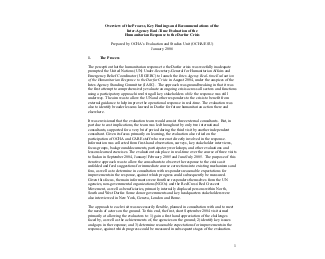
This is the final report of an inter-agency real-time evaluation of the Darfur response. Its main conclusion is that the response to the crisis in Darfur was delayed and inadequate. The findings included the following: (1) Nearly all agencies and organisations were unable to mobilise the appropriate capacity to respond to the Darfur crisis. (2) A deeper UN field presence would have allowed the UN to better lead and shape the response at the field level. (3) An agreed framework to protect human rights, and which addresses the full spectrum of rights, is critical. (4) More, not less, public advocacy on behalf of war-affected women, men, and children would have helped create a more protective environment. (5) Despite constraints, the needs of war-affected people would have been better met through more consistent, strategic, and coordinated sector leadership and planning. (6) Improved accountability and better monitoring are critical to improving performance. (7) The lack of a common understanding among responders of the operating environment, and among beneficiaries of the aims of the responders, impeded humanitarian action and contributed to avoidable mistakes. (8) More consistent methods for and integration of assessments would have minimised the inattention to cross-sectoral issues, in particular protection and gender. (9) The perceived tension between meeting short-term needs quickly and ensuring qualitative programming needs to be better managed. (10) The humanitarian community is not investing enough in its future workforce.
